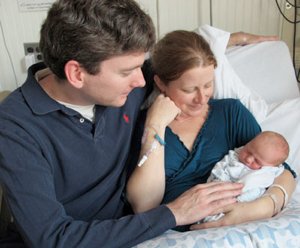 So you’re a first-time parent on the way home from the hospital with the new baby—but you’ve got little experience with infants. Relax! Here’s a basic rundown of what you ought to do.
So you’re a first-time parent on the way home from the hospital with the new baby—but you’ve got little experience with infants. Relax! Here’s a basic rundown of what you ought to do.
Going home
Whether you’re driving or not, you should properly strap your baby into a special infant car seat. Add some head support to prevent the head falling forward as he or she sleeps. Once you’re home, take the baby out of the special car seat and lay him or her safely onto a bed or crib.
Ambient temperature
The ideal temperature for a newborn baby’s room is somewhere between 67 to 72 degrees F (19 to 22 degrees C). There should be sufficient air movement or ventilation. Never leave the baby directly exposed to a draft, strong sunlight, or heat. Do check on your baby from time to time to see that he or she is comfortable. If the baby is fussy and feeling hot or cold, you can adjust the room’s temperature, the child’s clothing, or position in the room.
Sleep
Newborn babies can sleep as much as 20 hours per day, but a few hours at a time, waking up when they’re hungry or in need of washing or care, then falling asleep again. Which then means your usual sleeping patterns will be disrupted!
One way of countering this is to sleep in intervals, napping whenever your baby naps or whenever you have free time. It helps to have someone you can trust (your spouse or partner, a relative, a friend) who can take turns watching over the baby as you sleep.
Feeding
 A newborn baby sleeps for about 1 to 4 hours at a time, then wakes up feeling hungry. Eating patterns may vary. dont’t impose a strict feeding schedule; it’s better to just allow your baby to tell you (by crying or fussing) when he or she is hungry.
A newborn baby sleeps for about 1 to 4 hours at a time, then wakes up feeling hungry. Eating patterns may vary. dont’t impose a strict feeding schedule; it’s better to just allow your baby to tell you (by crying or fussing) when he or she is hungry.
A baby usually feeds for up to 45 minutes (about 10-20 minutes per breast if you’re breastfeeding). It helps to express your milk (by manual or electric pump) and store quantities of it in the freezer. That way your partner or anyone else can defrost and warm up the milk, then bottle feed your child even if you need to be somewhere else.
Burping
A baby swallows lots of air when feeding, so he or she needs to be “burped” to get rid of trapped gas. After or in-between feedings, pat or rub the baby’s back gently while he or she lies tummy-side down on your lap (or with the head leaning slightly over your shoulder, facing your back).
Cleaning and bathing
Practice putting on and changing baby diapers even before your baby is born; you’ll need it! Babies poop and pee a lot, going through 4 to 8 diaper changes per day. Clean up your baby’s anal and pubic area thoroughly with each change, with scent-free wet wipes.
Unless absolutely necessary (i.e., your baby is smelly or dirty), dont’t bathe your newborn baby too often or you’ll dry out his or her skin. Give your baby a gentle, thorough sponge bath with lukewarm water and mild soap. Gently pat the little one dry before putting on diapers and clothes.






